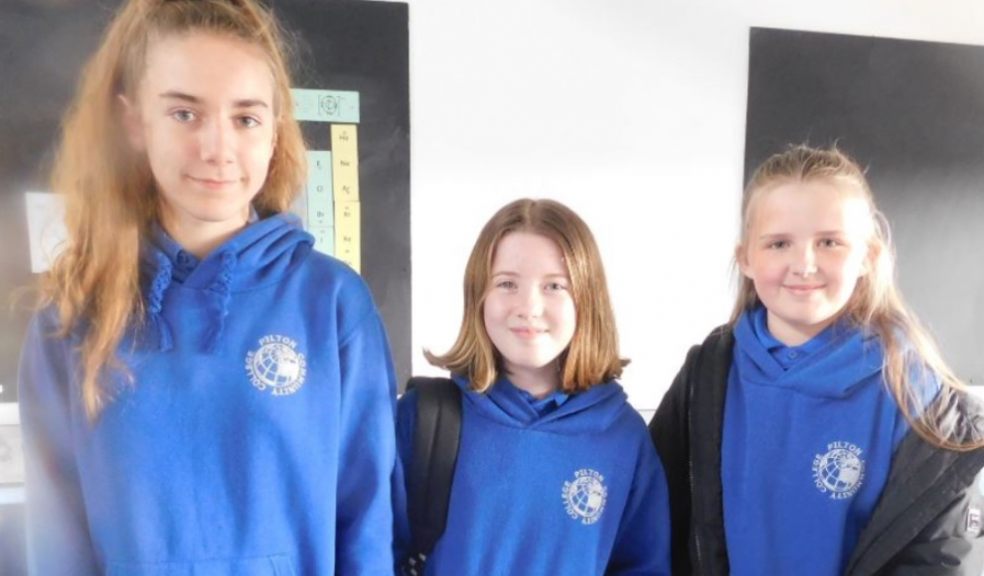
Nine young SW teams in the final 40 of the Amazon Longitude Explorer Prize for young inventors and innovators
Nine teams of young people across Devon and Somerset have made it to the national finals of the Amazon Longitude Explorer Prize this year. This includes five different teams from Churston Ferrers Grammar School near Brixham – a record in the prize’s history.
The Amazon Longitude Explorer Prize, delivered by Nesta Challenges, pairs entrepreneurial skills not usually taught in the classroom with the STEM curriculum to encourage young innovators from across the UK aged 11-16 to create tech solutions to the big challenges of our time - such as climate change, healthy living, ageing well and staying better connected.
There are some great ideas from South West teams in the running this year which were developed and submitted at the height of lockdown.
- Carbon Footprint Calculator by the ‘Environment Champions Team’, West Exe School, Exeter - An app that measures a user’s carbon footprint and helps them to make informed decisions on where to shop.
- Better Sleep by ‘Team BED’, Churston Ferrers Grammar School, Brixham - An app designed to promote healthy sleeping habits, by using monitoring capabilities and providing helpful tips.
- Calm by ‘Team MN5D’, Churston Ferrers Grammar School, Brixham - A wearable device and app for people living with PTSD that uses sensors and GPS tracking to monitor behaviour and notifies friends and family of PTSD episodes.
- Greenworld by ‘Team Go Green’ Churston Ferrers Grammar School, Brixham - A wearable device and app that tracks green habits, using app gamification to incentivise the user to form more sustainable behaviours, with a virtual city that improves in relation to the user’s environmental conduct.
- Medibox by ‘Team LERC’, Churston Ferrers Grammar School, Brixham - An automated medication container, linked to an app, that distributes medication at set times, and at the correct dose, while reminding patients of medical appointments.
- Robot Care Assistant by ‘Team EGEL’, Churston Ferrers Grammar School, Brixham - An AI robot to support dementia patients, helping them to retain independence and reducing carers’ workloads.
- River Plastic Cleanup by the UTC Plymouth Eco Project’ team, UTC Plymouth, Plymouth – A machine that combines technologies such as vortex pumps, a conveyor belt, bucket systems, sensors, audio and robotics to remove plastic from rivers before it reaches the ocean.
- Shop Organic Save Our Planet by the ‘Sustainable Sisters Team’, Pilton Community College, Barnstaple – An app that provides information on where to buy local produce and seasonal recipes to help reduce the user’s carbon footprint.
- Rainforest DRAGEN Project by the ‘Rainforest Dragen Team’, Mendip Studio School, Radstock (Somerset) - A product that records environmental data, with a focus on rainforests and conservation, accompanied by a website for sharing data, and learnings.
As well as being paired with an industry mentor, the teams will be supported with hardware grants, and will be invited to a virtual Enterprise Academy business day where they will learn important business skills. Pilton Community College was a runner up in the 2020 prize. Churston Ferrers Grammar School is the first to earn five finalist places since the prize started in 2015.
The Amazon Longitude Explorer Prize pairs STEM knowledge with new entrepreneurial skills and calls on young people to develop innovative ‘tech for good’ solutions to help solve society’s biggest issues.
Finalists also include a sea-cleaning robot sphere that detects and removes microplastics with infrared sensors; a hand sanitiser-dispensing and infrared thermometer phone case that reminds the user to wash their hands and take their temperature regularly, and an app that tackles period poverty and its link with female participation in sport and exercise by offering free monthly hygiene packs alongside motivation and fitness goals, and mental health tips.
Other game-changing ideas include a device that harvests kinetic energy every time a door is opened and closed to feed into the electricity grid;and a platform that uses AI to teach people sign language.
The Amazon Longitude Explorer Prize received more than 150 entries this year from over 500 young people across the UK. 40 finalists projects, submitted by teams of 11-16 year-old students, have been selected by a panel of expert judges including Jacqueline de Rojas CBE, President of techUK, Lauren Kisser, Director at Amazon’s Development Centre in Cambridge and DeepMind’s Obum Ekeke, Global Lead for University Relations & Education Partnerships.
The finalist teams will each be connected to an expert mentor from Amazon and other industry-leading organisations. They will mentor teams on topics such as data analytics, software engineering, robotics, and app development, to create prototypes of their concepts to help determine the winner this July. They will all be invited to participate in the Amazon Longitude Explorer Prizes’ Enterprise Academy business day workshops and will also receive one-to-one technology support from FireTech UK - the UK’s leading technology course provider for children aged 8-17.
In July, the winning team will be awarded £20,000 for its school or youth group, with three teams of runners-up to be awarded £5,000 each for their school or youth group. The public will also be given the chance to choose their favourite design in the People’s Choice Award in June, the winner of which will receive £5,000 prize money for its school or youth group.
Maddy Kavanagh, Education and Skills Programme Manager, Nesta Challenges, said: “It is a privilege to unveil the 40 inspirational teams that have been shortlisted for this year’s Amazon Longitude Explorer Prize. It has been amazing to be inundated with so many innovative entries despite the immense pressures faced by young people, teachers and youth workers alike. Schools are working extraordinarily hard to ensure students excel after lockdown, and youth groups continue to provide vital extra-curricular services and support. We are so pleased that the prize is introducing more young people to the exciting opportunities in science, technology, engineering and maths, supporting the growth of entrepreneurial life-skills, and developing their confidence at such a pivotal time. We can’t wait to see our teams develop their ideas into real-world prototypes in the next three months.”
Lauren Kisser, Director at Amazon’s Development Centre in Cambridge, and Judge for the Amazon Longitude Explorer Prize, said: “Supporting young people to discover a passion for - and ultimately consider future careers in - STEM is more vital than ever, and it’s fantastic to see such great engagement in the prize across the country. It’s been a joy to see what the nation’s next generation of inventors and innovators have come up with, especially under such unusual and challenging circumstances this year.
“The Amazon Longitude Explorer prize is part of Amazon Future Engineer, our comprehensive childhood-to-career programme to inspire, educate and enable children and young adults from lower-income backgrounds to discover computer science and engineering. We’re looking forward to getting started with the mentorship programme and seeing the finalists’ ideas come to life.”
Jacqueline de Rojas, CBE, President at techUK and Judge for the Amazon Longitude Explorer Prize, said: “Whittling down all of the amazing entries was incredibly difficult but we are delighted to be able to share 40 deserving finalists. The submissions have been really innovative in the way they have applied technology and real-world promise and bringing with them potential for huge impact. It will be a privilege to watch these innovative ideas blossom with support from industry experts, alongside the passion, skills and confidence of the talented young people taking part.”
Other shortlisted ideas include an eco-friendly water bottle that encourages the user to drink water more often; a wearable device for PTSD sufferers that uses sensors and GPS tracking to monitor behaviour and notify friends and family of episodes; a LGBTQ+ Youth app and website to connect and support those with similar experiences, through chat rooms, bots, fun enrichment activities and resources, and; a mealworm larvae filled box that breaks down non-recyclable plastic waste, using sensors to monitor for optimal decomposition conditions.
The Amazon Longitude Explorer Prize aims to address the lack of diversity in STEM industries by providing young people from all backgrounds with an introduction to the possibilities of entrepreneurship in STEM and becoming the disruptors of the future.
This year, more than half (58%) of all entrants to the 2021 Longitude Explorer Prize are young women. Following the 2020 prize, 93% of the finalists said they would now like to pursue a career in STEM. 98% of 2020 finalists said they were inspired to pursue entrepreneurialism. 91% of young people taking part in the 2020 prize said they learned new remote working skills as a result. 100% of teachers and youth leaders who entered a team in 2020 said they would enter a team in the future.
To find out more about the Amazon Longitude Explorer Prize and all 40 of the finalist teams visithttps://longitudeexplorer.challenges.org/.
















